

Design a MOOC – Think Granular! Editor’s Note: This is a guest post by Elke Lackner (University of Graz), Martin Ebner and Mohammad Khalil (Graz University of Technology).
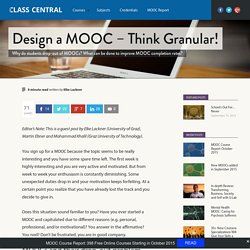
You sign up for a MOOC because the topic seems to be really interesting and you have some spare time left. The first week is highly interesting and you are very active and motivated. But from week to week your enthusiasm is constantly diminishing. Some unexpected duties drop in and your motivation keeps forfeiting. At a certain point you realize that you have already lost the track and you decide to give in. Kosten und Wert von MOOCs am Beispiel der Plattform iMooX.
Netzwerklernen - Einleitung - Was ist Konnektivismus? Risiken und Nebenwirkungen des Konnektivismus Inhaltsverzeichnis 1.

Lerntheorien 2.0 - Folge 4 - Konstruktivismus. Netzwerklernen - Was ist eigentlich Konnektivismus? Definitionen, Erläuterungen, Vor- und Nachteile. Die gute Forschungsfrage – und wie man dazu kommt. Posted on November 4, 2014 by sansch Für die Teilnehmer/innen Lehrgang Hochschuldidaktik T3C habe ich zusammengetragen, was gute Forschungsfragen sind und wie man dazu kommt – aus Perspektive des Forschenden als auch des/der Betreuers/Betreuerin von Studierenden.
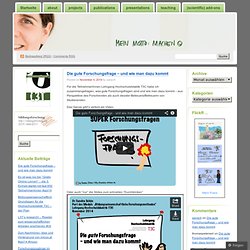
Das Ganze gibt’s vertont als Video: Anforderungen an Teletutoren. MOOC research literature browser. Learning and Connectivism in MOOCs. Week 1 - What Is Connectivism? ~ CCK11. You are not logged in. [] [] [Outline] [Week 2] Dates: January 17 - 24, 2011 Overview At its heart, connectivism is the thesis that knowledge is distributed across a network of connections, and therefore that learning consists of the ability to construct and traverse those networks.
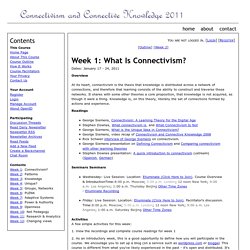
It shares with some other theories a core proposition, that knowledge is not acquired, as though it were a thing. Trialogical learning. Manifestationen von WebLernen – eine kleine Sammlung von Beispielen. Manifestationen von WebLernen Immer häufiger fällt mir bei meinen Streifzügen durchs Web etwas auf, was ich WebLernen nennen möchte.
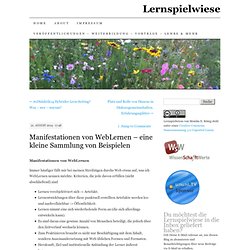
Kriterien, die jede davon erfüllen (nicht abschließend) sind Lernen verobjektiviert sich -> Artefakt.Lernentwicklungen über diese punktuell erstellten Artefakte werden les- und nachvollziehbar -> Öffentlichkeit.Lernen nimmt eine sich wiederholende Form an (die sich allerdings entwickeln kann).Es sind daran eine gewisse Anzahl von Menschen beteiligt, die jedoch über den Zeitverlauf wechseln können.Zum Praktizieren braucht es nicht nur Beschäftigung mit dem Inhalt, sondern Auseinandersetzung mit Web üblichen Formen und Formaten.Herzkunft, Ziel und institutionelle Anbindung der Lerner äußerst heterogen.Das was man tut wird während des Tuns mitreflektiert. Beispiel 1 – #acwri Bei #acwri handelt es sich um einen Hashtag auf Twitter, der dazu dient, an einem gegenseitigen Unterstützungsnetzwerk zum akademischen Schreiben teilzuhaben. Enhanced MOOCS_gmw14. Even in a MOOC, Students Want to Belong. Maybe we could rename a mob of meerkats as a MOOC … For the past couple of years Australian universities’ enthusiasm for online learning has increased, following the lead of international universities in realizing the potential of massive open online courses (MOOCs) to replace traditional face-to-face learning.
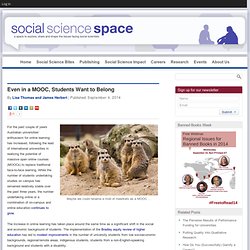
While the number of students undertaking studies on campus has remained relatively stable over the past three years, the number undertaking online or a combination of on-campus and online education continues to grow. The increase in online learning has taken place around the same time as a significant shift in the social and economic background of students. The implementation of the Bradley equity review of higher education has led to modest improvements in the number of university students from low socioeconomic backgrounds, regional/remote areas, indigenous students, students from a non-English-speaking background and students with a disability. 14 Articles on MOOCs.
Size Isn’t Everything – Cathy Davidson – The Chronicle Review – The Chronicle of Higher Education Wired UK raises the possibility that the university may have to restructure itself.
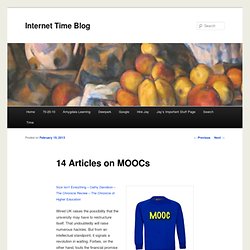
That undoubtedly will raise numerous hackles. But from an intellectual standpoint, it signals a revolution in waiting. Forbes, on the other hand, touts the financial promise of investments in MOOC’s and other digital educational offerings. Entrepreneurs and college administrators are already heeding that siren call. The Professors Behind the MOOC Hype - Technology. Dave Chidley for The Chronicle Paul Gries, of the U. of Toronto, has taught MOOCs on computer science.
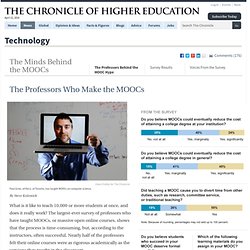
By Steve Kolowich What is it like to teach 10,000 or more students at once, and does it really work? The largest-ever survey of professors who have taught MOOCs, or massive open online courses, shows that the process is time-consuming, but, according to the instructors, often successful. The MOOC Problem. The purpose of education is in large part linked to its standing as a social science.
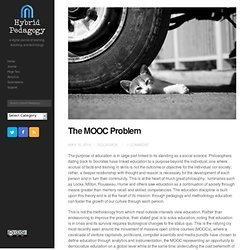
Philosophers dating back to Socrates have linked education to a purpose beyond the individual, one where accrual of facts and training in skills is not the outcome or objective for the individual nor society; rather, a deeper relationship with thought and reason is necessary for the development of each person and in turn their community. This is at the heart of much great philosophy: luminaries such as Locke, Milton, Rousseau, Hume and others saw education as a continuation of society through means greater than memory recall and skilled competencies. The education discipline is built upon this theory and is at the heart of its mission: through pedagogy and methodology education can foster the growth of our culture through each person.
This is not the methodology from which most outside interests view education. Hybrid Pedagogy uses an open collaborative peer review process. IS UNIT WEB SITE - IPTS - JRC - EC. MOOCKnowledge MOOCKnowledge is a 3-year study that aims to develop a knowledge base with a European view on MOOCs through continuous and systematic collection and analysis of data on existing MOOC initiatives to advance scientific understanding of this new phenomenon.
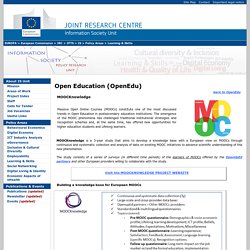
The study consists of a series of surveys (in different time periods) of the learners of MOOCs offered by the OpenUpEd partners and other European providers willing to collaborate with the study. Building a knowledge base for European MOOCs The study consortium wants to make agreements with as many MOOC providers as possible to produce large-scale data basis allowing analysing the MOOC-phenomenon from a European perspective based on scientific evidence. Partners. Ten Useful Reports on #MOOCs and Online Education. Supported by the Norwegian Ministry of Education and Research, the International Council for Open and Distance Education (ICDE) is the leading global membership organization for open, distance, flexible and online education, including e-learning, and draws its membership from institutions, educational authorities, commercial actors, and individuals. ICDE was founded in 1938 in Canada as the International Council for Correspondence Education and today has members from over 60 countries worldwide.
Steve Matthewman, Michel Foucault, Technology, and Actor-Network Theory, Techné: Research in Philosophy and Technology (Philosophy Documentation Center) Special edition on research on MOOCs in the journal ‘Distance Education’ How to Succeed in a Massive Online Open Course (MOOC) by Apostolos Koutropoulos & Rebecca J. Hogue. “MOOCs provide a new methodology and modality for teaching and learning. This newness does pose some problems for learners, but also provides for exciting new possibilities.
MOOCs require learners to be more proactive in their education and in building their personal learning networks (PLNs). Everyone can be successful in a MOOC, provided that certain steps are taken and strategies devised before, during, and after a MOOC.” What You Need to Know About MOOC's - Technology. We'll be updating this page regularly.Please check back for updates. Call it the year of the mega-class. Colleges and professors have rushed to try a new form of online teaching known as MOOCs—short for "massive open online courses. " The courses raise questions about the future of teaching, the value of a degree, and the effect technology will have on how colleges operate.
Struggling to make sense of it all? On this page you’ll find highlights from The Chronicle's coverage of MOOCs. Understanding MOOCs from the perspective of Actor Network Theory (ANT): Refraiming pedagogy and unmasking power. (Nach zwei erfolglosen Versuchen, das Paper bei einer Zeitschrift zu platzieren, stelle ich es nun hier zur Verfügung.)